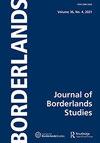Border Jobs: The Business of Work on the Colombia/Venezuela Border
IF 1.4
Q2 GEOGRAPHY
引用次数: 0
Abstract
ABSTRACTThis article explores the life and work of Venezuelan migrants in the Colombia/Venezuela border neighborhood of La Parada, in the Colombian municipality of Villa del Rosario, Department of Norte de Santander. We use ethnographic fieldwork, complemented with a simple survey we helped organize in the area, to show how border jobs are shaped and depend upon a variety of actors such as state institutions, non-governmental and other humanitarian organizations, members of guerrilla groups, and paramilitaries. All these actors have influence and control different aspects of the flow of goods and people across this busy border, where the distinction between legal and illegal transits is blurry in every sense. The overlapping territorialities that these actors shape through different practices articulate a particularly precarious life for migrants who must learn to read and respond to volatile and changing systems of border control. We discuss the perspectives of migrants themselves and show how they had to respond to the effects of the quarantine instated during the COVID-19 pandemic.KEYWORDS: Migrationborderscross-border laborColombiaVenezuela AcknowledgementsThis work was supported by the Scientific Colombia Program – EFI Alliance: Programs and Policies for the Promotion of a Formal Economy, code 60185, which are part of the EFI Alliance – Formal and Inclusive Economy, under the Contingent Recovery Agreement No. FP44842-220-2018.Disclosure StatementNo potential conflict of interest was reported by the authors.Notes1 This paper is part of the project titled “Destinos Colombianos: experiencias migrantes de venezolanos en tres regiones del país” which was reviewed and approved by the Ethics Committee of the Universidad del Rosario, in Bogotá, under the filing number DVO005 140-CS101 on October 11, 2018.2 Unless we give a specific date, all equivalences in US dollars are calculated using the exchange rate for August 28, 2021, when the interview was conducted.3 Colombia has no ius soli or birthright citizenship (Price Citation2017) but agreed to give migrant children born in the country Colombian nationality to honor its commitments in the fight against statelessness.Additional informationFundingThis work was supported by the Scientific Colombia Program – EFI Alliance: Programs And Policies For The Promotion Of A Formal Economy – Formal and Inclusive Economy, under the Contingent Recovery Agreement No. FP44842-220-2018: [Grant Number code 60185].边境工作:在哥伦比亚/委内瑞拉边境工作的业务
摘要本文探讨了在哥伦比亚北桑坦德省罗萨里奥别墅市哥伦比亚/委内瑞拉边境地区拉帕拉达的委内瑞拉移民的生活和工作。我们利用人种学田野调查,辅以我们在该地区帮助组织的一项简单调查,来展示边境工作是如何形成的,以及如何依赖于各种行动者,如国家机构、非政府组织和其他人道主义组织、游击队成员和准军事人员。所有这些行为者都影响和控制着货物和人员在这一繁忙边境流动的不同方面,在这一边境,合法和非法过境的区别在任何意义上都是模糊的。这些行为者通过不同的做法形成了重叠的领土,这对移民来说是一种特别不稳定的生活,他们必须学会解读和应对不稳定和不断变化的边境控制系统。我们讨论了移民本身的观点,并展示了他们如何应对COVID-19大流行期间实施的隔离的影响。本工作得到了科学哥伦比亚项目- EFI联盟:促进正规经济的计划和政策(代码60185)的支持,该项目是EFI联盟-正规和包容性经济的一部分,根据应急恢复协议No. 6。fp44842 - 220 - 2018。披露声明作者未报告潜在利益冲突。注1本文是题为“哥伦比亚人的命运:委内瑞拉移民的经验”项目的一部分,该项目于2018年10月11日由波哥大罗萨里奥大学伦理委员会审查和批准,文件编号为DVO005 140-CS101。除非我们给出具体日期,否则所有美元等值均使用2021年8月28日进行采访时的汇率计算哥伦比亚没有出生公民权或出生公民权(Price Citation2017),但同意给予在该国出生的移民儿童哥伦比亚国籍,以履行其在打击无国籍状态方面的承诺。本工作由哥伦比亚科学项目——EFI联盟:促进正规经济的计划和政策——正规和包容性经济——根据应急恢复协议(No. 1)提供支持。FP44842-220-2018:[授权号代码60185]。
本文章由计算机程序翻译,如有差异,请以英文原文为准。
求助全文
约1分钟内获得全文
求助全文

 求助内容:
求助内容: 应助结果提醒方式:
应助结果提醒方式:


